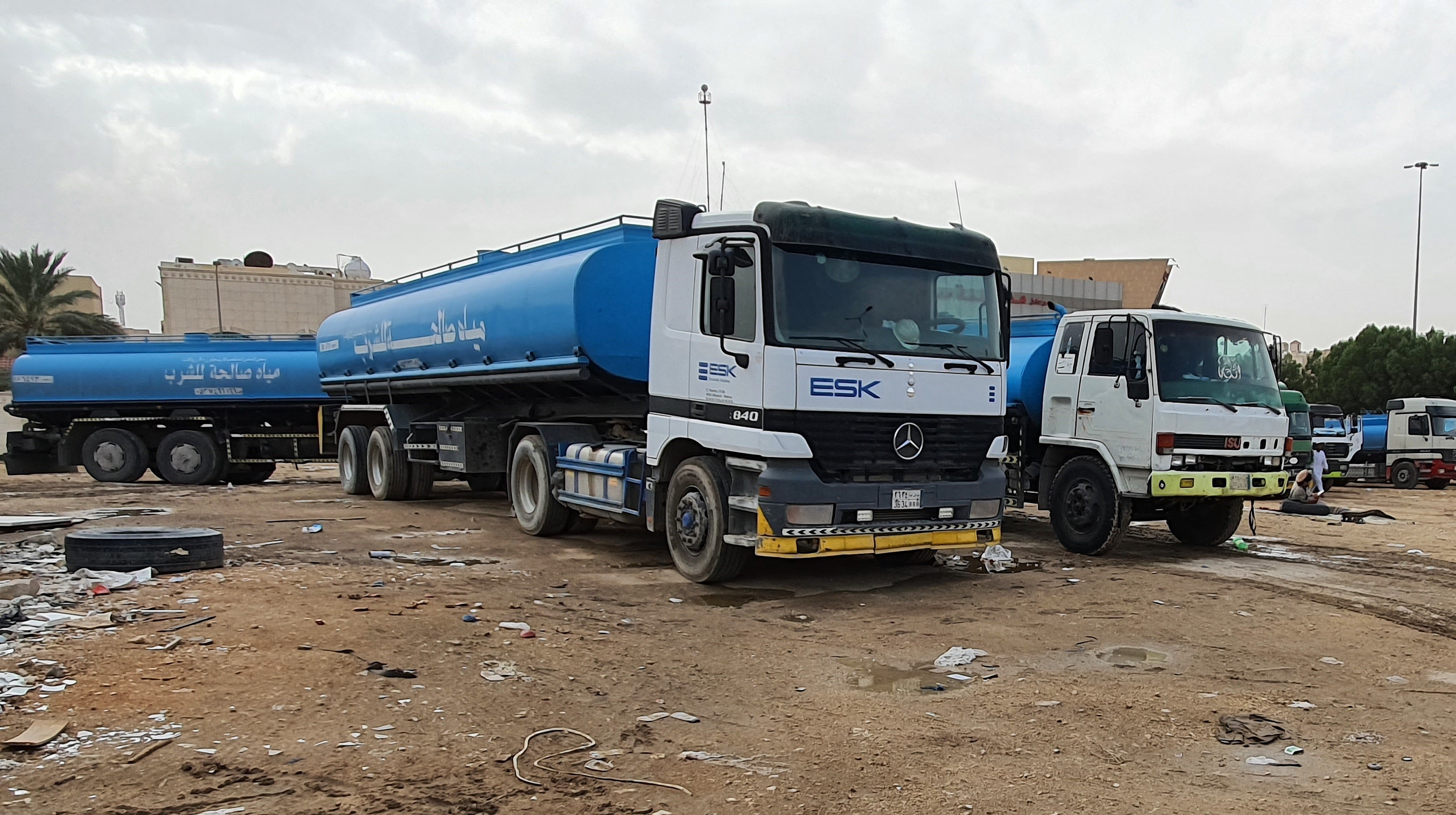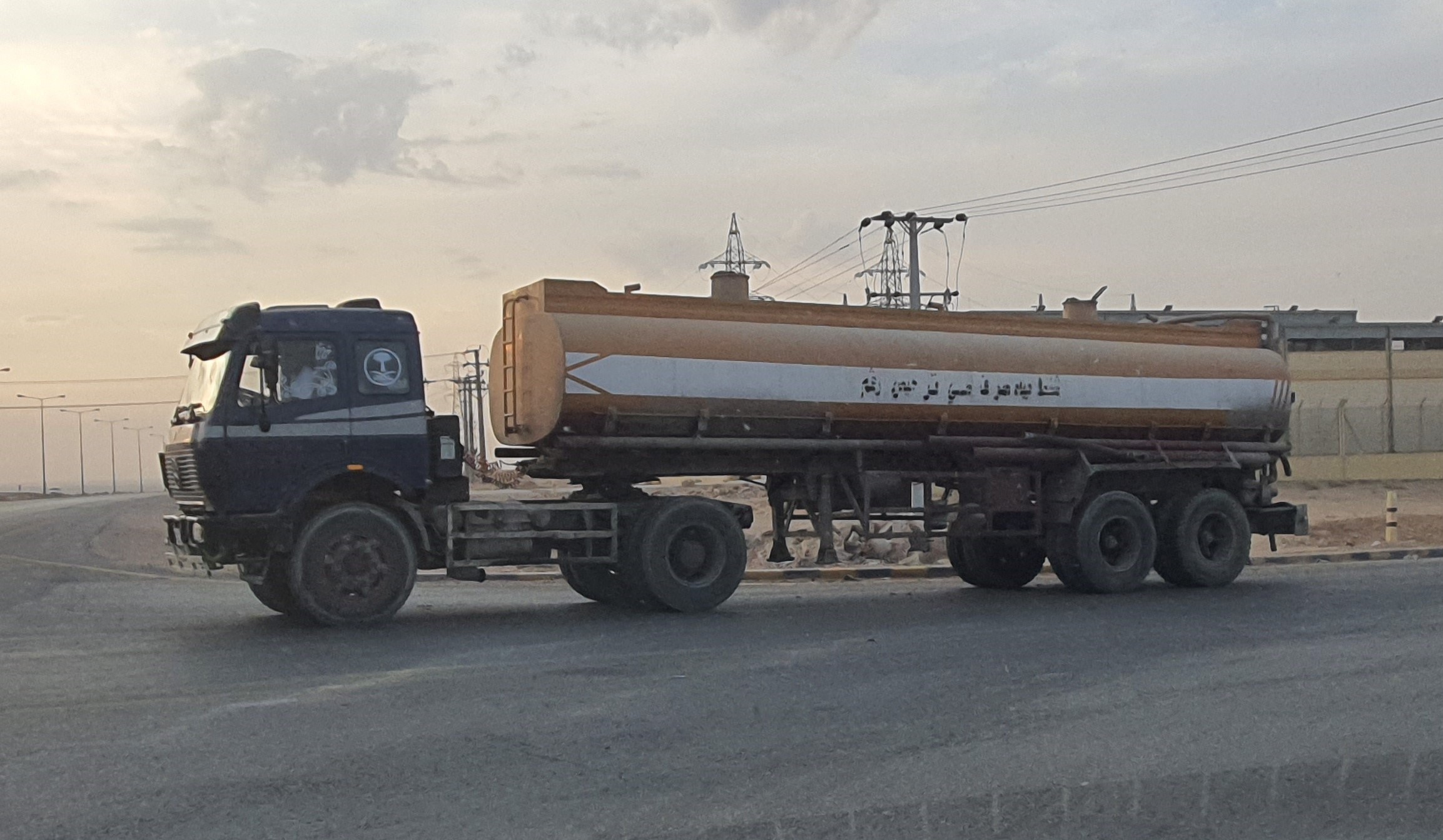Water
Water is a basic necessity for life, and here I am living in the middle of a desert with the nearest classified river to be found north of the Tigris-Euphrates delta on the Kuwait-Iraq border, some 600km from Riyadh. Just to keep the pedants happy, yes there are watercourses in KSA but they are all seasonal which doesn’t make them rivers which have to be perennial. The watercourses are known as wadis (or by their Arabic plural Widyan), and they are dry for most of the year and then if there is rain – most winters we see some – they can fill quickly and become torrents. But then they leach away or evaporate and that’s it for another year.
But I and the other 7,999,999 inhabitants of Riyadh need water to live, so where does it come from? There are two main sources – aquifers and desalination. The former is a source from underground lakes and porous rock containing as much as (according to National Geographic) 500 cubic kilometres of fresh water, which they compare in volume to Lake Erie, one of the Great Lakes. That’s a lot of water. It is pumped out and used for freshwater domestic and industrial supplies and agriculture. Yes, they grow crops in the desert. In some areas, notably in the north near Qurriyat, and in the centre near Al Kharj there are hundreds of circular fields which are irrigated by a borehole feeding a rotating watering spray. The spray from is a 3-dimensional A-frame on wheels, sweeping slowly around like the minute hand on a 1km diameter clock. The grass and wheat is used in food production, surprisingly KSA produces enough grain to make bread for the whole population, and grass to feed the cattle who live in huge cooled byres and produce enough milk for us all to drink. But this ground source water is a finite resource and the amount of seasonal rain doesn’t go anywhere near to replenishing the amount used. Estimates are that in 2020 more than 80% of this precious resource has been used up. Somewhat ironic that the economy is firmly based on extracting liquid from below, yet the oil reserves have a long way to go, the water has only a few years at the current rates of consumption. So something radical will have to happen to replace the ground water.
The desalination is a truly mega industry. Every city has its own DS plant(s) and water pipes criss-cross the country. It’s pumped around as salt water, with Riyadh sourcing most of its supply from the Arabian Gulf coast 400km away. Once it reaches the city it is converted locally, because with leakage and seepage losses it means that it is more efficient to convert nearer to the consumption point. The DS plants are diesel generator fuelled so that’s a more reliable (and cheaper here) energy source than grid electricity. In fairness, the grid electricity is pretty robust, I cannot recall any serious really outages.
Water is piped around the city, but some installations (such as our compound and all critical infrastructure) have substantial storage tanks. For these tanks, water is delivered by road tankers which operate from distribution points around the city. There are two colours of tankers – blue containing potable water, and orange ones which collect the waste and take it to water recovery plants outside the city. I’d like to think the recycled water is sent for industrial or agricultural use, but I really don’t know.

They bringeth...

...and they taketh away
We use bottled water for drinking and tap water for cooking. When we moved compounds earlier this year we noticed that the calcium content of the water we get from the taps is significantly higher in the new place. So much so that the kettle I have had from day 1 furred up and had to be replaced. So I’m guessing that we are on DS water here and the previous compound had an artesian well source. Bottled water is readily available and cheap to buy. A standard 1 litre bottle costs around 1 SAR (20p) from the supermarket, so it is clearly subsidised for us. And if we buy large 5 gallon (c22 litres) bottles for our water dispenser in the apartment, this costs well less thank 1 SAR per litre. Thanks, Saudi Government. High quality imported brand drinks are available to buy in smaller bottle sizes, and this includes Evian, Volvic and Perrier, which are not subsidised. A common quality water in restaurants is Highland Spring, which I’m really pleased to see as it comes from just a few miles from my childhood home in Perth. And by the way, to make it more eco-friendly, Highland Spring is switching to rail distribution and is currently constructing rail freight sidings at its bottling plant at Blackford, Perthshire. But none of these imported waters which have travelled 1,000s of kms to get here tastes anything like the fresh water we get free from our taps back at home – unpurified and straight from the Scottish hills around Biggar. It amazes me that supermarkets in Scotland have the temerity to sell bottled water, because all we drink comes in fresh – Glasgow water is straight out of Loch Katrine, and Edinburgh water from reservoirs in the Pentland hills. Scottish people – you do not know how blessed we are with our water. Who on earth buys the bottled water? Tourists? Again, to be fair, there are some localities in Scotland that still have residual lead piping in the supply, so people there might be wary of unwanted additives, no matter how miniscule the traces might be. But even so if you are not sure, you can get effective filters.
We take great quality Scottish water for granted. We realised this when we lived in the south east of England in Kent, where the local water was from reservoirs but had a high calcium content (although this varied from town to town – we found Cranbrook water to be significantly better than Tonbridge, Paddock Wood and Ashford water, which in turn were miles better than London water which had reportedly been ‘recycled’ a number of times.
Saudis seem – to my alien eyes – to have little sense of water conservation. For example, my phone gets bombarded with messages from the Government – exhorting me to report coughs and sneezes, report corrupt practises, keep safe when it rains*, look after national security – all worthwhile topics, but nothing about conserving the most precious resource. As part of the pre-prayer rituals a muslim should ritually clean himself, and from my observations this seems to be by splashing running water on hands and feet in a prescribed manner. But rarely anywhere public in the Kingdom have I seen a sink with a plug for the hole. Not in offices or public convenciences. Why not?
A side effect of drinking water from plastic bottles is waste management of the plastic bottles themselves. Apart from the largest 5 gallon bottles which have a deposit and are returnable, all smaller sizes are disposable. And there doesn’t appear to be any organised recycling policy here, it’s a very disposable society. I guess this is a legacy of being an oil-rich society which has yet to see the benefits of resource husbandry and conservation. And plastic is of course a hydrocarbon based material. It saddens me to go anywhere and see the litter left by previous visitors. There is also vey little understanding of tidying up – it is common to stop at a pleasant-looking spot on a desert road and get out of the car and have to avoid stepping on the detritus abandoned by previous visitors. Saudi has many beautiful corners, but a lot of these are spoiled by skip-loads of discarded plastic water bottles and other litter. In the city of Riyadh the city authorities employ an army of yellow-clad street cleaners who spend their days picking up litter. Sadly they are fighting a losing battle, it is all too common to see citizens jettisoning rubbish from car windows. Just this week I wa stopped in a queue at traffic lights and the car in front’s door opened and a whole pile of rubbish – including two plastic bottles – was tipped out. And the car was in the middle lane at the lights so as well as being unsightly it was an instant traffic hazard. We in the UK have a strong conservation and tidiness ethic, it is a shame to be somewhere that doesen’t have that – yet. So, Authorities, if you are reading this, please can you start two campaigns, to conserve water and to stop littering. It will make your fascinating country so much better. And with tourist visas expected to restart in January why not try and make a really good impression on the visitors you will get?
* Received this week from Civil Defence, and translated via Google Translate app – “Expectations indicate that the intensity of rain varies from medium to torrential, starting from today until next Sunday..and the Civil Defense calls on everyone to take caution and stay away from the valleys and streams of torrents..your cooperationis our goal..and your safety is our goal.”
